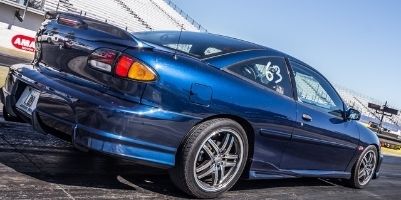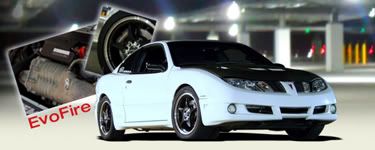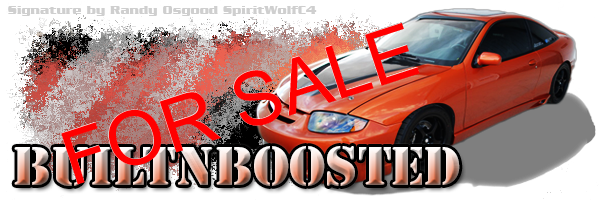If you look at my tune you would think I have huge horsepower numbers, However I am only making 340 whp.. I put a lot of money into this car and I feel like I was short changed on my tune. I see some cavaliars and cobalt setups that are simmilar, but they are around 400whp or higher... should I get my car re-tuned? I thought with my 20g turbo and supporting mods that I would see more power. I am currently on 19Ib of boost. What should I do? Can anyone help me, and tell me if they think I have a good setup, I've been doing a lot of research and I just can't figure out why it seems I am behind other cars with the same setup.
What kind of dyno?
What was the IDC on the injector's?
What is the AFR the car is pulling?
How much timing?
 FU Tuning
FU Tuning
I would talk to Ryan Egleston at PnP Tuning in St. Louis.
Here is the link to his profile here.
If you send him a copy of your tune he will give you an honest answer on it.
But 340whp might be about right with your setup, even though 375whp seems more like where it should be.
Also, John has some very good questions as well.
Edited 1 time(s). Last edited Tuesday, September 27, 2011 12:45 PM
PRND321 Till I DIE
Old Motor: 160whp & 152ft/lbs, 1/4 Mile 15.4 @88.2
M45 + LD9 + 4T40-E, GO GO GO
the dyno used was a dyno jet used with hptuners
I don't know what the IDC was, just that the injectors were 630cc micron, I know that these are popular with cobalts and that they can be pushed up to 800cc
the afr was 11:8
I don't know what the timing was either, sorry...
I do have the the dyno sheet if that would help?........
I will say I was able to tune a bone stock Ecotec with boost to 314whp and 324wtq, so it does seem a little low for your setup.
But possible the injectors are near the limit. maybe not enough timing. Maybe the tune in general.
 FU Tuning
FU Tuning
yea man post up the dyno sheet.
what mods done to the engine?

Addicted to meth wrote:I will say I was able to tune a bone stock Ecotec with boost to 314whp and 324wtq, so it does seem a little low for your setup.
But possible the injectors are near the limit. maybe not enough timing. Maybe the tune in general.
how long did it hold for befor eit exploded?

That number sounds about right. If my math is right you are flowing about 555 cfm's for that much power which puts to smack dab in the middle of the turbo map at peak power. not perfect but pretty good.
1994 Saturn SL2 Home Coming Edition: backup car
2002 Chevy Cavalier LS Sport Coupe: In a Junk Yard
1995 Mazda Miata R-package Class=STR
Sponsored by:
Kronos Performance
WPI Class of '12 Mechanical Engineering
WPI SAE Risk and Sustainability Management Officer
-Z Yaaaa- wrote:yea man post up the dyno sheet.
what mods done to the engine?
really Brad? normally the correct thing would be "Fill out your profile so we can see what you've done" bull@!#$, but hell, he's just a bit ahead of us.
Brians Profile wrote:Engine:
62mm TB
Comp turbo cams
patriot stage 2 performance head
hahn stage 2 with 20G t3/4 57 trim
NGK spark plugs
Stock ignition
greddy speck 2 boost controler
630cc sima deka fuel injectors
Rk Sport light weight crank pulley
ARP Main/Head/Rocker Studs
Block bored .020 over
Wiseco Pistons
Eagle Rods
Stock crank
Cometic Head Gasket
Walbro 255lph Fuel Pump
Spec Stage 3+ Clutch
Driveshaft Shop level 3 Axle kit
Spec Flywheel
Gm high output 2.2L intake manifold
Magnaflow exhaust
Quafie limited slip differential
Prothane Front Trans-Mount
Prothane Rear Trans-Mount
Prothane lower engine mount
Prothane control arm bushings
Rk sport upper engine mount
Hp Tuned
Built by Aca performance
Tuned by Race Proven Motor Sports
I need a new sig.
Well, the biggest flag to me without actually knowing the timing and IDC numbers is that it was "tuned" on a Dynojet. You really need a variable load dyno like a Mustang or Dyno-Dynamics to really achieve the proper load to replicate road and track conditions.
Did you bring up any of your concerns with your tuner? I'm sure there is probably a legitimate reason if they decided not to push it more. 11.8:1 is a good safe AFR but 630cc injectors may be too small to adequately compensate for more boost. The other thing is that tuning for boost with HPT is a sort of special voodoo at best given that the stock Jbody ecu uses Alpha-N and not speed density.
Arrival Blue 04 LS Sport
Eco
Turbo
Megasquirt
'Nuff said

EvoFire wrote:Addicted to meth wrote:I will say I was able to tune a bone stock Ecotec with boost to 314whp and 324wtq, so it does seem a little low for your setup.
But possible the injectors are near the limit. maybe not enough timing. Maybe the tune in general.
how long did it hold for befor eit exploded?
That motor was ran for over a year at those boost levels, even drove to the bash in 2010.
 FU Tuning
FU Tuning
You can tune WOT on a dynojet but thats about it. But I wouldnt consider it worth the time, much less the money to tune on a dynojet. Maybe if it was a max effort n/a car and you already got the fueling tuned it and just wanted to optimize the spark timing at wot.
1994 Saturn SL2 Home Coming Edition: backup car
2002 Chevy Cavalier LS Sport Coupe: In a Junk Yard
1995 Mazda Miata R-package Class=STR
Sponsored by:
Kronos Performance
WPI Class of '12 Mechanical Engineering
WPI SAE Risk and Sustainability Management Officer
Leafy (Club Jeffie FEA man) wrote:You can tune WOT on a dynojet but thats about it. But I wouldnt consider it worth the time, much less the money to tune on a dynojet. Maybe if it was a max effort n/a car and you already got the fueling tuned it and just wanted to optimize the spark timing at wot.
I always like to street tune first. Then go on the dyno for fine tuning (timing adjustments), and numbers.
 FU Tuning
FU Tuning
Addicted to meth wrote:Leafy (Club Jeffie FEA man) wrote:You can tune WOT on a dynojet but thats about it. But I wouldnt consider it worth the time, much less the money to tune on a dynojet. Maybe if it was a max effort n/a car and you already got the fueling tuned it and just wanted to optimize the spark timing at wot.
I always like to street tune first. Then go on the dyno for fine tuning (timing adjustments), and numbers.
this is how my tuner does it. You dont just tune WOT on the dyno... you fine tune everything too.

Thanks everyone for the response! I will make sure that I get my dyno sheet loaded up so you can see the numbers. I think it sounds like I need to get another tune in the future, and while I'm at get the What was the IDC on the injector's? What is the AFR the car is running and How much timing so I can have more info for you guys to give me some ideas and pointers. But it sounds like I have 400+ in the engine! I just need to find it.
wow that really makes me wonder now? How did you go that high in power on stock parts. My engine is the opposite of stock. the main thing is I have high flow cylinder head the cams 62mm throttle body and a 20g, that alone should really push some power. I wish I had your tuner, or did you do it... Good job on that!
Brian Hunter wrote:wow that really makes me wonder now? How did you go that high in power on stock parts. My engine is the opposite of stock. the main thing is I have high flow cylinder head the cams 62mm throttle body and a 20g, that alone should really push some power. I wish I had your tuner, or did you do it... Good job on that!
Wasn't my car (my Friends), and I tuned it.
 FU Tuning
FU Tuning
BuiltNBoosted wrote:Addicted to meth wrote:Leafy (Club Jeffie FEA man) wrote:You can tune WOT on a dynojet but thats about it. But I wouldnt consider it worth the time, much less the money to tune on a dynojet. Maybe if it was a max effort n/a car and you already got the fueling tuned it and just wanted to optimize the spark timing at wot.
I always like to street tune first. Then go on the dyno for fine tuning (timing adjustments), and numbers.
this is how my tuner does it. You dont just tune WOT on the dyno... you fine tune everything too.
We're only talking about "only WOT" in regards to a Dynojet specifically. They are a weighted roller type dyno, and thus cannot apply the wide range of loads you need to really properly tune and engine. What you guys are talking about is all well and good as long as you're doing it on a dyno that has variable-load capability, like a Mustang dyno.
Arrival Blue 04 LS Sport
Eco
Turbo
Megasquirt
'Nuff said

Also, a street tune can get you pretty close, close enough for most people to consider it perfectly OK, but the only real way to optimize drivability and particularly power through timing is a load-bearing dyno. Period. A load bearing dyno allows you to hold in whatever cell you need to in the table indefinitely, and also gives you feedback as to how much power is being produced. Neither a road tune, now a dynojet will ever allow you to do that properly.
Arrival Blue 04 LS Sport
Eco
Turbo
Megasquirt
'Nuff said

JerseyJayLN2 (Scarab) wrote:Also, a street tune can get you pretty close, close enough for most people to consider it perfectly OK, but the only real way to optimize drivability and particularly power through timing is a load-bearing dyno. Period. A load bearing dyno allows you to hold in whatever cell you need to in the table indefinitely, and also gives you feedback as to how much power is being produced. Neither a road tune, now a dynojet will ever allow you to do that properly.
in regards to power yes.
But I feel the street gives better optimized drivability.
 FU Tuning
FU Tuning
Its not like we can really tune for drivability on these cars, we cant get to transient fueling. I mean we can do some, but the meat and potatoes of drivability is transients.
1994 Saturn SL2 Home Coming Edition: backup car
2002 Chevy Cavalier LS Sport Coupe: In a Junk Yard
1995 Mazda Miata R-package Class=STR
Sponsored by:
Kronos Performance
WPI Class of '12 Mechanical Engineering
WPI SAE Risk and Sustainability Management Officer
Addicted to meth wrote:JerseyJayLN2 (Scarab) wrote:Also, a street tune can get you pretty close, close enough for most people to consider it perfectly OK, but the only real way to optimize drivability and particularly power through timing is a load-bearing dyno. Period. A load bearing dyno allows you to hold in whatever cell you need to in the table indefinitely, and also gives you feedback as to how much power is being produced. Neither a road tune, now a dynojet will ever allow you to do that properly.
in regards to power yes.
But I feel the street gives better optimized drivability.
Here's the problem; what you feel and what is fact are not necessarily the same thing. Street tuning has it's place, don't get me wrong. But without a dyno that can help you hold in individual cells and give you feedback on torque you'll always be leaving something on the table. It doesn't just help with power, it helps you to hit more cells, cells you can't necessarily hit on purpose in a street driving situation but may stumble into accidentally. When these get adjusted on a steady state dyno you wind up with a more refined map with fewer hiccups, AND optimized power.
Tuning by the seat of your pants will never be as effective as tuning with an instrument that can actually give you real-time feedback on what you just changed.
Arrival Blue 04 LS Sport
Eco
Turbo
Megasquirt
'Nuff said

JerseyJayLN2 (Scarab) wrote:Addicted to meth wrote:JerseyJayLN2 (Scarab) wrote:Also, a street tune can get you pretty close, close enough for most people to consider it perfectly OK, but the only real way to optimize drivability and particularly power through timing is a load-bearing dyno. Period. A load bearing dyno allows you to hold in whatever cell you need to in the table indefinitely, and also gives you feedback as to how much power is being produced. Neither a road tune, now a dynojet will ever allow you to do that properly.
in regards to power yes.
But I feel the street gives better optimized drivability.
Here's the problem; what you feel and what is fact are not necessarily the same thing. Street tuning has it's place, don't get me wrong. But without a dyno that can help you hold in individual cells and give you feedback on torque you'll always be leaving something on the table. It doesn't just help with power, it helps you to hit more cells, cells you can't necessarily hit on purpose in a street driving situation but may stumble into accidentally. When these get adjusted on a steady state dyno you wind up with a more refined map with fewer hiccups, AND optimized power.
Tuning by the seat of your pants will never be as effective as tuning with an instrument that can actually give you real-time feedback on what you just changed.
sorry hitting those cells are no easier on the dyno than the street. You still have to hold the throttle at them, and adjust it as the RPM goes up, because map changes etc...
Still I agree the dyno is a tool, and used as such.
and when I said "feel " earlier it was not menat as I could feel anything, but my opinion.
If I spent the hours opn dyno time that I have put into my car and many others, well would likely buy a few more cars with it.
Edited 1 time(s). Last edited Friday, September 30, 2011 6:06 AM
 FU Tuning
FU Tuning
No you have the dyno hold a certain speed.
1994 Saturn SL2 Home Coming Edition: backup car
2002 Chevy Cavalier LS Sport Coupe: In a Junk Yard
1995 Mazda Miata R-package Class=STR
Sponsored by:
Kronos Performance
WPI Class of '12 Mechanical Engineering
WPI SAE Risk and Sustainability Management Officer
Leafy (Club Jeffie FEA man) wrote:No you have the dyno hold a certain speed.
Yes I'm aware, but you still have to adjust the throttle because once you get to a steady speed it all changes.
Maybe because I have gotten use to it on the street it is not that hard to hit the cells.
I'm sure if I spent the same amount of hours on the dyno as I have street tuning I would feel diffeent.
 FU Tuning
FU Tuning










